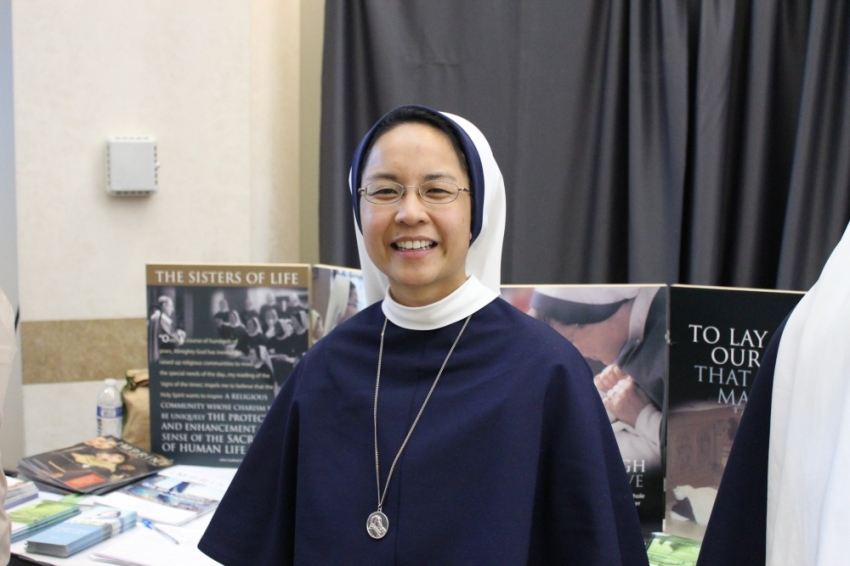Nuns celebrate victory after New York agrees not to investigate their pro-life pregnancy centers

A group of Catholic nuns is celebrating now that the state of New York has agreed not to seek “sensitive information” about the clients they serve at the pro-life pregnancy centers they run.
The religious liberty law firm Becket announced in a Nov. 6 statement that the Sisters of Life had reached an agreement with the state of New York, where the Catholic-operated network of pregnancy centers dropped its litigation against the state in exchange for a promise not to subject them to government investigations as authorized by a 2022 law derided by critics as an attempt to target pro-life pregnancy centers that do not provide or offer referrals for abortions.
As part of the agreement, the state agreed “not to take any enforcement action of any kind against Plaintiff based on Plaintiff’s nonresponse to or noncompliance with any survey, document request, or information request of any kind authorized by or issued by Defendant.”
The Sisters’ lawsuit followed the June 2022 enactment of a statute authorizing and directing the commissioner of the New York State Department of Health “to conduct a study and issue a report examining the unmet health and resource needs facing pregnant women in New York and the impact of limited service pregnancy centers on the ability of women to obtain accurate, non-coercive health care information and timely access to a comprehensive range of reproductive and sexual health care services.”
Additionally, the statute authorized the state to request “data and information” from “limited service pregnancy centers” that do not provide or offer referrals for “abortion” services.
Filed in September 2022, the complaint contended that the statute constituted a violation of its First and Fourth Amendment rights under the U.S. Constitution.
“We are grateful for this victory, which protects our right to continue to uphold and defend the beauty and strength of women,” said Sr. Maris Stella, vicar general of the Sisters of Life. “In over 30 years of serving women in the state of New York, we have learned that what a woman really needs is to be seen, heard, and believed in, which is why we are committed to providing the necessary emotional, practical, and spiritual support for her to flourish.”
After highlighting how "we are called to bring hope, comfort, and joy to women who feel they have nowhere else to turn,” the nun expressed confidence that “the judge’s order will protect us as we continue our ministry.”
Becket President and CEO Mark Rienzi shared Stella’s enthusiasm for the development, describing the order as “a win for the Sisters and the women they serve.”
Rienzi added, “The government should never have enacted this law, and we are thrilled that it ends with a federal court order that the state should just leave the Sisters alone while they do their important work.”
As noted in the complaint, the statute authorizing the state of New York to investigate pro-life pregnancy centers was part of a package of legislation described as a “nation-leading legislative package to protect abortion” following the May 2022 publication of a leaked United States Supreme Court decision in the case of Dobbs v. Jackson Women’s Health Organization. The Dobbs decision, handed down in June 2022, determined that the U.S. Constitution does not contain a right to abortion.
After the leak, pro-life pregnancy centers found themselves subject to violence and vandalism in addition to becoming the targets of vitriolic rhetoric from pro-abortion politicians. The complaint cited the statute’s legislative record as “rife with evidence of content and viewpoint discrimination.
Specifically, the lawsuit detailed how sponsor memos for both the Senate and Assembly versions of the bill contend that pro-life pregnancy centers “engage in misleading or deceptive practices” and “provide inaccurate, misleading, or stigmatizing information about abortion and contraception.” It also stated that New York’s Democrat Gov. Kathy Hochul uttered the phrase “we all know what that means” when referring to “limited service pregnancy centers” that don't perform abortions.
Additionally, the complaint elaborated on what kind of information Sisters for Life would be asked to provide the state if it became the subject of an investigation.
The state would have the authority to ask about “organizational funding; membership in umbrella organizations; services provided and most frequently sought; the number of women who access services, the geographic regions in which each woman resides, and ‘basic demographic information about each woman, including race, age, and marital status.’”
“Building relationships of trust and confidence with pregnant women is a core component of the sisters’ ministry,” the lawsuit added. “Many of these women disclose sensitive information about their lives, their needs, and their hopes for the future precisely because they trust the Sisters to hold that information in confidence.”
Ryan Foley is a reporter for The Christian Post. He can be reached at: ryan.foley@christianpost.com



























